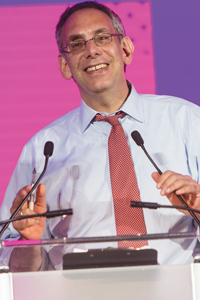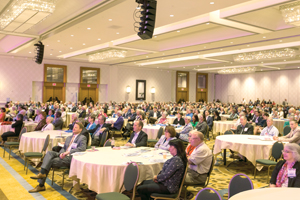By BETSY TAYLOR
NEW ORLEANS — StoryCorps' founder Dave Isay sees an intersection between the work of the Catholic health care ministry and that of his well-known nonprofit that encourages two people to sit down together and record an interview. Sharing stories allows for bridges of care and understanding to be built between people, he said.
Isay gave the opening keynote address June 11 at the 2017 Catholic Health Assembly here. Isay, a radio producer, founded StoryCorps with a mission that has resonance with the ministry — to preserve and share humanity's stories in order to build connections and ultimately create a more compassionate world. The health ministry espouses the importance of hearing each patient's story, to build relationships with each as an individual in order to better attend to physical, mental and spiritual needs.

Dave Isay
Photo by Jerry Naunheim Jr./© CHA
Isay said he draws inspiration from a Benedictine, Sr. Mary Lou Kownacki, who said: "It's impossible not to love someone whose story you've heard."
StoryCorps opened its first recording booth in Grand Central Terminal in New York City in 2003. Since then, Isay said, StoryCorps has recorded about 400,000 interviews in such booths, in Airstream trailer recording studios that traverse the country, and through its computer app. Commonly, the interviews are conducted by a family member or a close friend or colleague of the subject, and they can be intimate and unguarded.
The recording booth interviews are facilitated by a StoryCorps staff member or volunteer. StoryCorps asks that interviewers come prepared with a list of questions for their 40-minute recording sessions, and it offers some suggestions on its website. Recorded interviews are added to the StoryCorps archive, housed at the American Folklife Center at the Library of Congress. Participants also get a digital file of their session.
At the assembly, Isay shared audio from StoryCorps interviews, distilled to the touching essence of each story; some of the conversations were animated with simple line drawings. The clips included some of the project's most celebrated and moving stories. One was of Julio Diaz, a social worker in the Bronx, N.Y. Diaz told a friend about being robbed at knifepoint. He gave his young assailant his wallet, then offered him his coat and invited him to join him for a meal at a diner where Diaz was a regular customer. The teenager accepted. To the young man's surprise, waiters and dishwashers came to the table to greet Diaz and when he remarked on it to Diaz, Diaz said he'd been raised to be nice to everyone. The teen said he didn't know anyone who lived that way.
When it came time to pay for the meal, Diaz asked for his wallet back and paid the check. He gave his mugger $20, and asked that the young man surrender his knife in exchange, which he did. Diaz said in his interview, he believes if you treat people right, they'll treat you right. "It's as simple as it gets in this complicated world," he said.

The assembly audience listens to StoryCorps’ Dave Isay.
Photo by Jerry Naunheim Jr./© CHA
StoryCorps interviews air on National Public Radio, and Isay also encouraged assembly participants to download the StoryCorps podcast (storycorps.org/podcast), after an audience member suggested they'd provide a useful reflection tool in ministry workplaces.
Isay has received numerous awards for his work, including six Peabody Awards, a MacArthur "Genius" Fellowship and the 2015 TED Prize, awarded annually to one individual with a vision to spark global change. In April 2016, his fifth StoryCorps book, Callings: The Purpose and Passion of Work, was released.
StoryCorps' work includes health care-focused initiatives. One of those, called "The Memory Loss Initiative," records and preserves the stories of people living with memory loss, early in the progression of their disease. In 2010, StoryCorps started "Legacy" to record, preserve and share stories from people with life-limiting illnesses, their families and their caregivers. StoryCorps has partnered with health care systems and organizations around the country on Legacy. The organization provides training to its partners on how to conduct interviews and provides equipment for recording.
The Providence Institute for Human Caring, which supports the Legacy project, also has teamed up with StoryCorps on a new "Hear Me Now" project. In Los Angeles; Anchorage, Alaska; and Missoula, Mont., StoryCorps is providing Providence St. Joseph Health staff and volunteers with tools and training to record conversations between patients, families and care providers.
Dr. Ira Byock, the founder and chief medical officer of the Institute for Human Caring, said in a video shown at the end of Isay's talk that Hear Me Now fosters deep listening in a fast-paced health care culture, and reflects the love for one another that has always been at the core of health care. Hear Me Now interviews are available at providence.org/hear-me-now.
Copyright © 2017 by the Catholic Health Association
of the United States
For reprint permission, contact Betty Crosby or call (314) 253-3490.